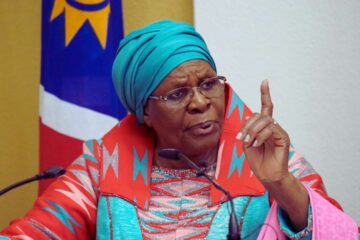Niël Terblanché
Prime Minister Elijah Ngurare has called on newly graduated Namibia Correctional Service (NCS) officers to uphold the values of humanity, dignity, and national service.
Delivering a message on behalf of President Netumbo Nandi-Ndaitwah at the 31st basic training graduation ceremony in Omaruru on Wednesday, Ngurare urged the graduates to treat inmates with respect.
“Treat all inmates with humanity and dignity, in accordance with international protocols and standards. Your legal duty is to guide and support inmates in recognising and accepting their past mistakes, thereby aiding their reform and enabling them to become productive and law-abiding citizens,” he said.
The event took place at the Lucius Sumbwanyambe Mahoto Correctional Service Training College. Of the 280 recruits admitted into the course, 278 completed their training and are ready for deployment.
Ngurare described their academic performance as commendable.
“The highest trainee scored an impressive 95%, and the lowest a respectable 50%,” he said.
He said the graduation comes at a critical moment for the country.
“This graduation takes place at a pivotal moment in our national development journey, as we intensify efforts to combat unemployment and reduce poverty,” he said.
The new correctional officers were described as a boost to the NCS and a contribution to wider efforts to strengthen institutions and improve service delivery.
Ngurare reaffirmed the government’s commitment to a correctional system based on rehabilitation. He referred to the Offender Risk Management Correctional Strategy, which focuses on reintegration rather than punishment.
“This approach represents a progressive shift from punitive incarceration to rehabilitation and reintegration,” he said.
He highlighted skill programs that target the root causes of criminal behaviour, including substance abuse and a lack of education.
One such area is agricultural training. Between 2017 and April 2025, over 13,898 inmates participated in these programmes.
“By empowering inmates with agricultural skills, the NCS not only reduces the likelihood of reoffending but also contributes significantly to national food security and institutional self-sufficiency,” Ngurare said.
He added that the NCS grows wheat, produces maize meal, and maintains pork production facilities, which support both inmates and the Namibian Police.
Ngurare also pointed to operational challenges such as shortages in staff, uniforms, security equipment, housing, and transport.
He raised concerns about the safety of officers living in informal settlements and urged the Ministry of Home Affairs, Immigration, Safety and Security to prioritise building employee villages, starting in Windhoek.
He warned graduates to uphold ethical standards and avoid any involvement in smuggling or helping inmates escape.
“Preserve the good name of the Namibian Correctional Service. Be patriotic, courageous, and disciplined at all times,” he said.
Quoting Nelson Mandela, he added: “A nation should not be judged by how it treats its highest citizens but its lowest ones.”
The ceremony was attended by local dignitaries, traditional leaders, and representatives from correctional services in Botswana, Eswatini, South Africa, Zambia, and Zimbabwe. Guest instructors from these countries also contributed to the training.




